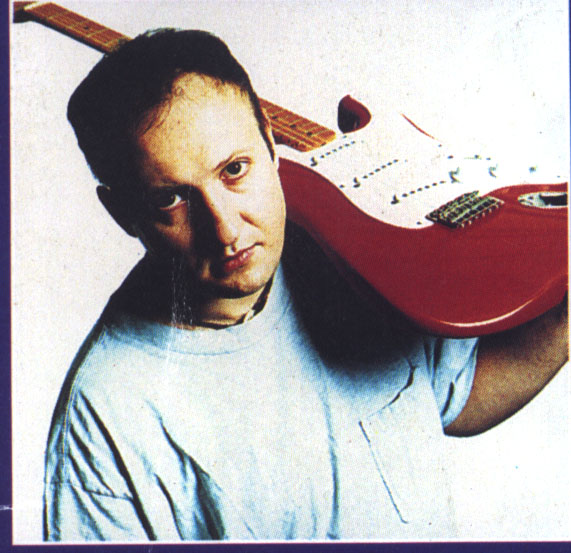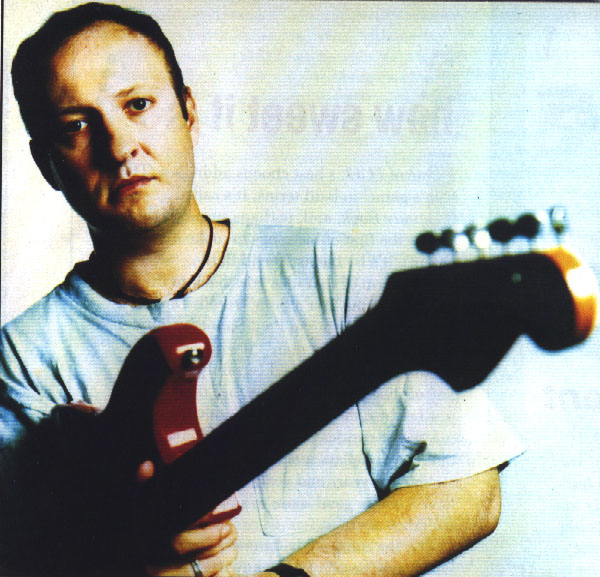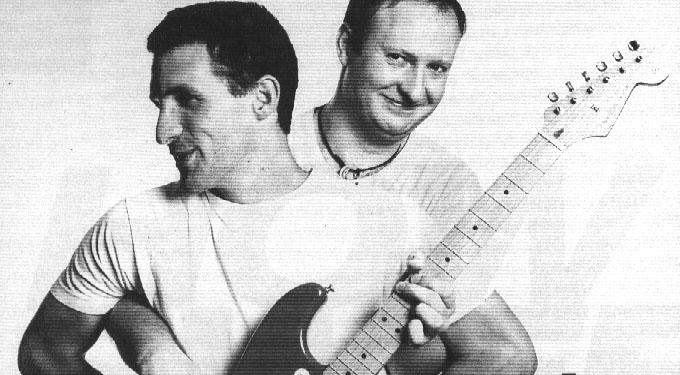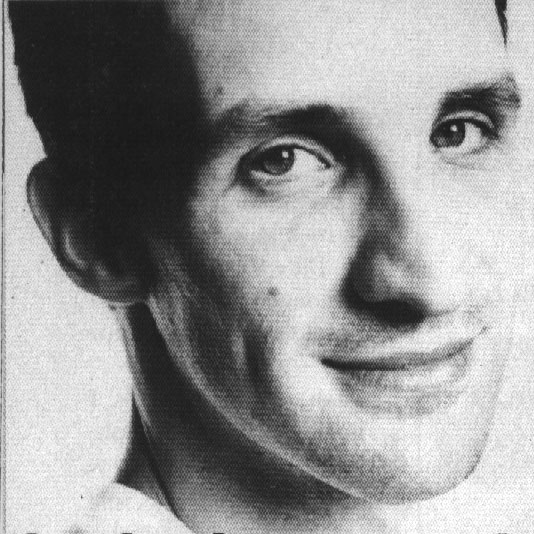| The Guitar Magazine (UK) September 1994 |
HOW
SWEET IT ISFile Under Easy Listening beams the cover; the grooves inside suggest otherwise. Danny Eccleston meets Sugar's Bob Mould and David Barbe on the release of their third album and finds that age has not mellowed them. 'Recording this has been a pretty brutal experience…'

'
Gooooooooooaaaaaaaaalllllllllllll!'Bob Mould's eyes bulge scarily as he struggles to recreate a classic soccer moment. World Cup fever may be a thing of the past here in blasé Britain,, where the beautiful game - like pubs and Pukka Pies - is just another part of the landscape, but the novelty has yet to wear off over the pond. Or so it seems.
'The great thing about watching of the World Cup in the states,' giggles Lord Bob, 'is we could immediately switch over to Univision, the Hispanic channel, every time anyone scored, for this mad Mexican commentator. He was like Pavarotti or something, just bellowing. I suppose you guys were shouting of for Ireland's?
Well, yeah. We explain that the English invariably support the Irish and Scots. The patronised Celts, however, like nothing better than seeing us soft southerners stuffed into the middle of next Tuesday. Our imperialist crimes aren't that easily forgotten...
'I see. It's kinda like major label bands and indy bands. Major label bands can like indie bands but indie bands can't like anyone on a major!'
Bob Mould may look rather more robust than a Best or a Giggs but give him a guitar and a yard of stage and he weaves a similar brand of magic. In the mid '80s, toting a mean Flying V and fusing the seemingly polarised notions of perfect pop and US hard-core punk, he revolutionised alternative rock with Husker Du. When the Minneapolitan trio folded back in 1987, at least partly due to the accelerating drug dependency of fellow songwriter Grant Hart, Mould hit a writer's block the size of Gibraltar, returning from a doubt-filled exile to craft the inspirational Workbook. Coming on the like Richard Thompson with a punk rock re-education it re-established his confidence, and though an ill-starred dalliance with Virgin Records (and the poorly received Black Sheets of Rain LP) rocked him again, Sugar has restored the balance.
FUEL (File Under Easy Listening, to use its full, if misleading title) is Sugar's third album and for the proof, if any were needed, of Mould's ability to meld the Byrds with Black Flag and pen courses that stick in the head for aeons. In the wake of the crisp, 'watch out I'm back ' glimmer of Copper Blue and the dark and brooding Beaster (both culled from the same set of sessions) it's brusquer and yet more thoroughly pop. If as Bob told us last time, their debut was the 'good' Sugar and Beaster the 'bad', where does that leave FUEL?
'Oh, I dunno…it's the new Sugar. I had to reconcile myself to the fact that it wasn't going to be another Copper Blue some time ago. There wasn't going to be another Copper Blue no matter what I wanted. This was an interesting record. It took a while to make -- I mean, we tried it twice. It was a pretty brutal experience.'
Exactly how close FUEL came to the abyss Sugar are disinclined to admit, but the hints are there. They began recording at Triclops Sound Studios in Atlanta, from whence emerged the pristine structures of Smashing Pumpkins Siamese Dream. However, it wasn't long before Mould, bassist David Barbe and Malcolm Travis realised something was seriously wrong.
'Something I learned', sighs Bob, 'was that you can do all the pre-production and planning in the world, but ultimately the vibe as the record is being recorded is so, so critical. Often it's the tiny things that we never think about, like the people who make the coffee, they make all the difference.'
'You know this guy was saying, "This is such a great room, so-and-so was in here, blah blah blah." But I didn't care who'd been in there and how they found it; why was I having to carry 4 X 8" pieces of sheet rock into the studio to get anything like a natural sonic reflection? Explain that one to me! DON'T tell me about Smashing Pumpkins! Tell me something I need to know.'
'We're not the only band we know of who've recently had to remake a record or had a record spend a good length of time in the shit,' adds David. I think you expect the minefields in the business dealings and hope that the creative end of it is pretty much under control, but that's not always the case. As you move into bigger and better studios the re wards can be greater but at the same time the traps are a lot more dangerous, the wolves are a lot more vicious and the lessons are much more expensive.'

'There was one point during the recording,' Bob reveals grimly, when I just wanted to go home and burn everything I owned that had the remotest connection with music.'
Musicians who remake records have more than the immediate financial implications to worry about. The press can descend upon a floundering album like a flock of ravenous buzzards, with suggestions of band rifts, fights and drug habits fuelling the bad air that poisoned the project to begin with. Luckily Sugar picked themselves straight back up, got the hell out of grimy Atlanta and bashed out the record they should have made in the first place.
'The second time we just rolled with it' says Bob. 'At the end of the day, the songs have it or they don't, and all the wizardry and production doesn't matter. It really doesn't matter if it sounds like Steeley Dan or if it sounds like Sugar - let's just get the song across. Now!'
Sonically the album's tough, positive sentiments have been lent an appropriately brash backdrop...
'It's very abrasive-sounding' admits Bob. 'It's a lot scratchier, which is cool. There were times in Atlanta where I got hung up on every tiny detail but for this it hardly took me 45 minutes to set up the guitar sound. Even Beaster is still a very smooth record compared with this one on first listen. This is a lot wilder, too. Like, Malcolm's hitting the ride cymbal way to hard and you can hear it phasing like crazy. But that's what a drum kits sounds like when you're playing it; it's not this very distant, clinical playing that Copper Blue had. There's a very different group dynamic now, we don't play the same as we did in the beginning and I think that was something, as a producer, I didn't take into account at the start of the project.'
Fuel's scuzzier ethic serves it well. A great record (say Exile on Main Street or King of the Delta Blues Singers) often survives the years because, as with a great cartoon, you're always spotting something - even if it's only a bum note or a barely perceptible ink blot - that you never noticed before.
'Well you'll get that with us all right,' chuckles Bob, 'and, yeah, that's what makes Loveless by My Bloody Valentine such a brilliant record still. Every time you hear it, it sounds different. Something leaps out and you think, "Wow! that wasn't there before." You only have to move off-axis a little bit and create a different phase relationship with your speakers and something else jumps out. Phew, that's depth!'
Unlike Copper Blue, which had the aura of novelty on its side, and Beaster, whose black musings startled everyone with their frankness, Fuel has no 'hook' to hang itself on. If it has a theme it's one of coming through crisis to some form of resolution... whereas Beaster paddled around in the swamps of the crisis itself.
'Oh yes. No doubt! I get tired of that paddling, believe me... This one's a lot more immediate, too. I think with pretty much every song, by the time you're a minute in you know what it's about. It's not like these long, six or seven minute, equations to get something. It's a reaction to Beaster in that sense at least.'
Amid Fuel's unpretentious collection of exceptionally cool pop songs there's one called Granny Cool. Now Bob's known for his big-hearted, humanistic anthems, but this is just a bit vicious. Is it about jealous rock stars who slag each other off?
'Well to me it's the film star who stayed around a little too long and didn't age well and all she has is a bag of memories. To me the concept is that you're still around, not doing anything of any great import any more. Actually, I think musicians beating other musicians down is a great thing, heheh! Let's face it's they deserve it; so many of them are just full of shit. But, no, it's just the thing about being around just a little too long... It might even be a self-applicable theory!
Possibly... If it weren't for the fact that Sugar's British gigs of crammed to the gills with spotty greenhorns whose memories of Husker Du have a clarity usually reserved for Neville Chamberlain, rationing or the Edgar Broughton Band. Sugar have clearly weaned a whole new litter of pop puppies.
'Well the complexion of the audience here in England I still haven't figured out,' muses Bob. 'I also don't know what to think about the "fair-weather" fan. But there's a lot of history here, not just mine but David's and Malcolm's too - people can look at it and see what made Sugar what it is. With a band on their first or their second single, that's like an immediate spark, an immediate charge, it's like a new video game of something. Maybe Sugar are like the old horse, tried and tested. You could say that these people haven't let us down in a big way, at any point over the last ten of 15 years. It's like, when you need quality you know where to find it'
'It dawned on me the other day that it's the rock 'n' roll dream to be huge and big and then disappear. So many bands want just that. But do you know what's really weird? It's like you wake up after 15 years and you realise you're still making music. So it's not a dream anymore... It's sort of reality! And suddenly you realise that your work has to get really good! It's not about smashing up the pub or whatever -- it's just, well, the next song's got to be better.'
Where Fuel isn't haranguing the listener with its crash-bang-wallop rock 'n' roll virtues it eases back to some of Bob's finest reflective numbers in ages. In fact in many ways the second side resembles a hyperventilating, kick-ass Workbook.
'There are moments that do sound like that, definitely: Panama City Motel; Can't Help You Anymore a little bit; and Explode and Make Up… well I figured that I hadn't written a song like that for eight or nine years and it was probably time. I think the delving into the more folk-oriented stuff was really nice, 'cos believe me, of the songs we had remaining, if those had made up side 2 it would have been an enormously different record. The ten songs that are on the record aren't necessarily my ten favourite or the ten best, but they're the ten that leave the best impression as to where we're at right now.'
Wet Bob it is right now is Austin Texas. A refugee from the accelerating insanity of New York City, he claims the trees and the earth have a soothing, balancing effect. Austin's also the home of Cedar Creek studios and the version of FUEL that the band can live with. That they should have fled the studios that Smashing Pumpkins made their own is rather apt; more than anything Sugar are a restatement of the punk rock guitar ethic which Billy Corgan, among other nouveau 'alternative' rock soloists, had begun to assail.
'Yeah, I'm sick of solos, I really am,' harrumphs Bob. 'There's a really nice one on Explode and Makeup, sort of a classic solo, but for the rest of it it's very much grab it by the neck and choke it out for eight bars then go back to the song. What You Want It To Be has a pretty cool one-note solo - the air raid siren! But really I'm just parking it's, letting everything else move around it. The Buzzcocks were masters of that. Of recent stuff, the new Sonic Youth album's got some cool playing on it, but most of all, Sonic Youth know how to play together, they know how to weave it. And there's the fact that Sonic Youth had been revitalised by the Pavement's, Sebadoh's and Guided By Voices, gone back to their lo-fi punk rock roots...'
'I just like the fact that they've gone back to being Sonic Youth, and all that involves. The whole political thing was so boring from them. Let Billy Bragg do that - I just wanted to see 'em rock. I think they're "going for it" the right way again, rather than "going for it" that other way, the big machine way, playing The Man's game, heh heh…'
One of FUELS best choons addresses 'The Man's game' in bald terms. It's called Company Book and, perhaps surprisingly (as it's the first of his songs to make a Sugar album), it's by bassist David Barbe
'The germ of that idea goes back to the sessions for the first album', recalls David. 'I remember referring to Paul Simon as the "ultimate company man". It's not necessarily about him but you could certainly apply it to any of those sixties has-beens that think that just because they were great innovators in the 60's it entitles them to sit back and make millions of dollars making boring shitty record's for years and years after they should have stopped. You know who they are!'
'But the thing is,' he intones, 'there's a whole new breed of company men out there. Some of the most "alternative" bands, the most "aggressive" rock bands are deep in their heart of hearts suckdogs of the industry. It's true! Of course everyone would love for a record company to give them zillions of dollars to do whatever the hell they want whichever way they want to do it, but it doesn't happen like that.'
Bob nods in assent.
'The real point is, do you have to have all of that to be able to make music? When you hear Sebadoh, you know the haven't any money, but their shit blows away all the little yes men who are running around with their gold records right now. My latest thing at the moment is that if I ever see something that's really bad, I say it is filled with sadness. Oh yes, Counting Crows are indeed filled with sadness...'
'I suppose in way you can't blame 'em. I mean, we're the oldsters now; this is the new generation and for them it's either this or McDonalds. So why shouldn't they cash in quick 'caus they know there's a quick turnover. They see bands that come and go in two years, so why shouldn't they milk it for every penny they can. It's like I said, it's the rock 'n' roll dream versus the music reality. When you've sustained and survived for more than five or six years it's not about the dream anymore. It's like you've established a place where you can do some decent work.'
If pop music had a consumer watchdog to protect us poor punters from sub-standard merchandise (and with 2 Unlimited still out there, like crushed glass in a cabbage patch doll, who's to say we don't need one) then Sugar would bear the ultimate calibre kitemark. FUEL confirms Mould's ability to live up to his own ridiculously high standards and, for his part, the rock 'n' roll ombudsman is justifiably impressed. As the man said: if it's quality you want, you know where to look. And you don't need to look to hard.
Bob's fuel nous!

For their rumbustious live performances, Sugar's setup has changed little since they took Copper Blue out on the road. Bob's preference for the USA Fender Strat Plus, '87-'88 vintage, persists. He leaves them largely stock, barring the addition of real Sperzel locking tuning pegs ('as opposed to the fake ones that Fender are making now') and a Lace Sensor pickup in the bridge position.
'Those red Lace Sensors are very much like the old Flying V's - that crazy humbucker sound. But the Strats are real flexible because you can start swiching positions. The Flying V only had one sound.'
His signal path remains fairly uncluttered: via an MXR Distortion Plus and a TC Electronics boost pedal he goes to a pair of Fender Concerts (the 1 X 12" combos), two Roland JC 120s and a clutch of Celestion-equipped Marshall 4 X 12" extension cabs.
'I'm also using an Eventide EH3000 in my stage rack, which before this year's AES show was, I think the state of the art multi-effects unit. I use it pretty minimally. I use "string modellers", whereby you hit a note and it creates a string-symphony type of feel. I use that and some backwards stuff but little else.'
'I've changed basses,' continues David. 'It's still a Fender Precision, but it's one I like much more. It's a '76 P-Bass, all standard except for the fact that I took the pickups out of my old one - an '88 - and stuck 'em in this one. They're EMG Selects, pretty low grade, but they sound great. I've tried peicing instruments together before, hot-rodding things, but this bass blows those away - it has what Malcolm calls the "mid-range growl." It definitely has that!'
On stage, Barbie favours a Gallien-Krueger 800RB head into one GK 4 X 10" and one Mesa/Boogie 4 X 10". In a studio, however, things are rather more complicated.
'For recording, I went direct via aFocusright preamp to a Summit DCL200 compressor to a Summit pre with a little input grit tossed in there and then to tape. And of course the Pultech EQP-1 for EQ.'
'Pultech stands for Pulse Technology,' explains Bob. 'They were around in the late '50s and early '60s, an old tube equalisation company. They're just these big ugly things with four knobs, but for anyone who's ever want to get a incredibly warm, impressive sound they are the first things you should go to. You see rather more around these days; they've become more popular and rather more pricey... A coupla thousand bucks for one tube equaliser!'
The Mould guitar sound is an unmistakable one: vicious, strident and always on the brink of spinning right out of control. Difficult to reproduce in the studio, you'd imagine...
'When I cut guitars,' he continues, 'I rent these old Neve 1064 preamps and EQs and they give a whole different kind presence. It's a little harder sound than the Pultech, which is more broad-band. In the wrong hands - usually mine! - they're really dangerous equaliser's, because you can really exaggerate the harmonics of an instrument, which is what the guitar sound on these records is all about, the high order harmonics boosted over the fundamentals.'
Still, the inimitable Sugar rush is obviously not all down to shedloads of discrete technology; it's even more overpowering live. Rather than wrestling with his instrument to pluck out the odd harmonic, Mould seems to struggle incessantly just to keep a lid on them...
'Well I'm holding a lot of drones and stuff for a start,' concedes Bob, 'but my signal routing involves the DBX compressors, so I'm crunching the sound down so much there's like one big wave of guitar that never gives up, heheh! But then this is a trio - I have to cover a lot of room with it!'
barbed comment

Let's face it: we all know about Bob Mould. The first record he bought was by The Monkees; he was in this ace band called Husker Du; he's now in this ace band called Sugar. But what of David Barbe? What do we know about the sinewy bassman whose onstage energy is such a vital part of Sugar's molecular makeup?
'Well,' he drawls, 'I've been playing in bands since I was about 11 or 12 years old - pretty shitty bands but bands nonetheless. In fact, if Bob or Malcolm ever got to hear a tape of a band I was in around that time I think I'd be kicked out of Sugar straight away!
Barbe then worked his way up the rock 'n' roll ladder via the band Mercyland, soon to have a CD reissued by those perennial pop archivists Rykodisc. I've just sent off the liner notes and everything,' says David 'and when that comes out it'll be a chapter closed, a huge gorilla off my back.'
'After that I was putting a lot of time into my family and playing a little with my friends, but I felt my days of slogging around in a van were pretty much done. Then Bob and I talked about playing together... and that was just the kick in the ass I needed.'
So here he is. But hang on, what was the weirdest band David was ever in?
'I used to drum in this band called The Challengers, which was a bit of a conceptual scam really, an excuse to get into bars and drink beer for free. We never rehearsed; we just made noise onstage, but because it was underpinned by the drums which kept to quite a disciplined tempo, it would appear deliberate. We supported Butthole Surfers once, our singer was wrapped in bacon and sausage and we threw buckets of live worms into the audience. They loved it. We played naked once, too, which was a bit shocking for our small town - we'd have a new gimmick for every gig. I remember being told about The Challengers by a guy who didn't realise I was actually in the band. He was saying, "it just looks like chaos, but then you relies that it's in fact meticulously planned!" I'm still not sure how I managed not to laugh...'